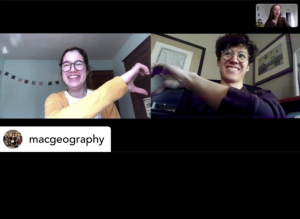
“I hope that we can cultivate a spirit of compassion and patience and flexibility to get us through this situation, and that on the other side of this current crisis—and there will be another side—that spirit is what remains.”
Joan Ostrove
Psychology professor and director of the Jan Serie Center for Scholarship and Teaching
In a few ways, Bergen Schmidt’s sophomore year routine continues unchanged: she’s doing the New York Times crossword puzzle with friends, trying out karate, and working on The Mac Weekly as the newspaper’s features editor.
But now all of that happens online via the virtual meeting platform Zoom, with Schmidt back home in Revelstoke, British Columbia, 2,000 miles away from St. Paul. “I’ve been trying not to let the distance interfere, because if this were a normal semester, I’d be seeing my friends every day,” Schmidt says. “I’m trying to keep those connections going as if we were in school.”
Most of her classmates are in the same position, along with millions of other students in colleges and universities around the country. As the COVID-19 outbreak accelerated in March, Macalester joined other institutions by announcing its decision to move to remote learning, part of a nationwide effort to slow the virus’s spread and prevent overwhelming the healthcare system.
Navigating remote teaching
Amidst sweeping changes that seemed unimaginable when the semester began, faculty across all divisions, as well as academic technology and library staff, grappled with the unexpected and immediate challenge of switching to remote instruction. Through the Jan Serie Center for Scholarship and Teaching, professors are able to connect and share ideas about how to best teach remotely.
Geography professor William Moseley tweeted on March 30, “First day of online teaching. We’ve adopted a flipped classroom model with recorded lectures and synchronous class discussions. Thanks to my world regional geography students for hanging in there.”
Maintaining community

After a month marked by uncertainty, the focus for the rest of the semester will be on adapting to new technology, supporting one another, and maintaining community, in creative and new ways. Through a Student Affairs-created online hub, students can connect and find community through student organizations, chat rooms, and programming, including wellness activities like yoga and fitness classes. The Community Engagement Center created Mac Solidarity, an initiative to encourage mutual aid and other support efforts. The biology and chemistry departments donated gloves to M Health Fairview hospitals and clinics.
Students are also mobilizing, individually and collectively. On March 24, Macalester College Student Government passed a resolution via Zoom to redirect some of its own remaining budget and ask student organizations to do the same, to support students with unexpected expenses and needs because of the COVID-19 crisis. Instead of immersing themself in Jordan during their study away, Kat Lewis ’21 (Arlington, Va.) hopes to reconnect with Macalester’s Voices on Mental Health chapter, which they co-chaired in the past. “With all the added stress, mental health becomes a huge part of the equation,” Lewis says. “I know when I’m struggling with mental health, it’s hard for me to know how to reach out to get help. And right now, it would be so easy to not reach out. There’s definitely room for action.”
Connecting from afar
“I’ve been talking to people I wasn’t that close with before this, and that’s surprised me. One thing I’m looking forward to: knowing how excited we’re all going to be to see each other again.”
—Sy Schimberg ’22
Like Schmidt and her friends doing crossword puzzles together, students—spread out unexpectedly all over the world—are finding new ways to stay connected despite the difficult circumstances. Back at home in Sarasota, Fla., Sy Schimberg ’22 has been keeping in touch with friends via texting and Snapchat, with one unexpected effect. “There are a lot of people who I’m closer to now than I’ve ever been,” he says. “With my friends, I’m keeping up almost out of necessity because I just miss them like crazy and can’t wait to live with them again. But I’ve been talking to people I wasn’t that close with before this, and that’s surprised me. One thing I’m looking forward to: knowing how excited we’re all going to be to see each other again.”

In the meantime, students, faculty, and staff will support one another from afar. “I hope that we can cultivate a spirit of compassion and patience and flexibility to get us through this situation, and that on the other side of this current crisis—and there will be another side—that spirit is what remains,” Joan Ostrove, psychology professor and director of the Jan Serie Center for Scholarship and Teaching, wrote in a message originally directed at faculty but applicable more broadly. “We’ll need it, and one another, for whatever is next.”
Follow along with Macalester faculty and staff at macalester.edu/macsocial
Rebecca Edwards ’21 contributed to this story.
For current updates on COVID-19 and campus events: macalester.edu/covid-19.
April 1 2020
Back to top




